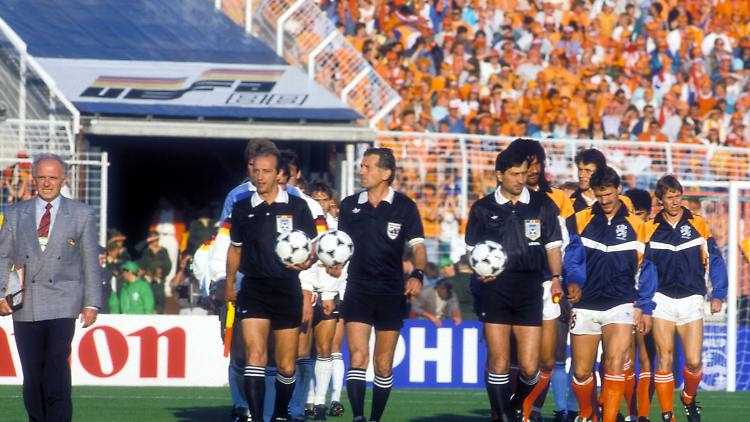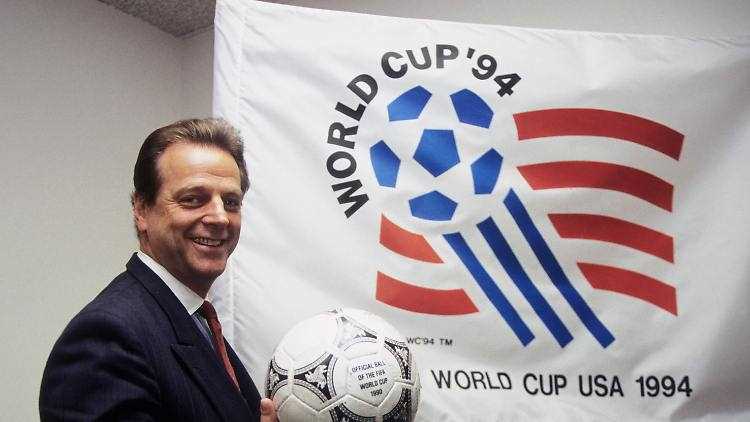Thursday, October 28, 2021
When Japan’s dream of the World Cup died
Showdown in Qatar and the tragedy of Doha
By Stephan Uersfeld
28 years ago the football world was looking at a tournament in Qatar. It has the potential to shape the future of football in the United States. The six participants are of great concern to the organizers of the 1994 World Cup. The Dutchman Hans Ooft has completely different problems. He lights a cigarette.
“Football, bloody hell,” said Sir Alex Ferguson, Manchester United coach, in 1999 after the historic 2-1 in the Champions League final against Bayern Munich. “Football, bloody hell”, thinks the Dutchman Hans Ooft as almost six years ago, and exactly 28 years ago today, the Iraqi Jaffar Omran Salman climbed up after a cross and did not give Japanese goalkeeper Shigetatsu Matsunaga the slightest chance. Ooft’s players fall to the ground like dominoes, pick themselves up briefly to thrash the ball towards the Iraqis’ goal after the kick-off and then collapse again. The Swiss referee Serge Muhmenthaler whistles for the game.
Shortly before that, Ooft, who was the first foreigner to be entrusted with the fate of the Japanese national team, sat down in his coaching bench in the Al-Ahli Stadium in Doha, took a pack of cigarettes out of his pocket and took a deep breath. His team is still one, maybe two minutes away from their first ever participation in the World Cup. From the grandstands he can hear the sound of the victory drums of the fans who have traveled with him.
“Can’t remember anything”
Around 300 made the long journey to experience this historic moment. But then an Iraqi winger sneaks past his opponents and crosses as if in slow motion. In the middle, Jaffar Omran Salman rises. The ball makes a large arc and lands in the net. Often puts out his cigarette.
Less than an hour before, Ooft is in the Japanese cabin. In large letters he writes “45 minutes to America” on the blackboard. Japan took an early lead through Kazuyoshi Miura and is on course for the World Cup. Because that’s what it’s all about. In a crazy qualifying group, they need that win against Iraq to qualify for the US finals.
It will turn out differently. First the first equalization, the renewed lead, then the header in stoppage time. The players slump. You can’t believe it. Blackout. “I can’t remember anything, the events in the dressing room, the interviews after the game and the bus trip back to the hotel,” said midfielder Hajime Moriyasu a few years ago.
The US is concerned
The tournament in Doha, Qatar is politically charged like no other at this time. In the second and final round of the Asian qualification for the 1994 World Cup, a total of six nations will compete against each other. Japan, Saudi Arabia, South Korea, Iraq, Iran and North Korea. The tournament is hastily staged – and under special observation by the USA.
They want to bring football to America with the World Cup. Everything is precisely planned. The first serve of football after the end of the circus league in the 1970s and 1980s. A gigantic show is planned for the draw. James Brown and Robin Williams will perform in Las Vegas and the incumbent US President Bill Clinton will emphasize the importance of the tournament with a video message. Diana Ross will later sing at the opening ceremony. Then the MLS, the professional league, was born. The stars are on board. But then the organizers hear about this tournament in Qatar.
“We couldn’t believe it. We held our breath,” said Alan Rothenberg, president of the American Football Association to qualify. ” In the USA, the worst-case scenario was prepared. Rothenberg: “We had a special budget for these teams. We should have checked everyone for links to terrorism. That would have devoured millions and millions of dollars.”
“None. Terrorists. In. America”
It is shortly after the first Iraq war. And the escalation between Iraq and Iran wasn’t long ago either. FIFA sends its best referees. One of them is the Romanian Ion Craciunescu, who has earned a good reputation for himself through his clear stance in the collapsing communism of his home country. “FIFA paid us double the money,” he told the “Blizzard”. “When we got there, Sepp Blatter told us that we could expect a real horror tournament.”

Ion Craciunescu was a line judge in the 1988 European Championship semi-finals between Germany and the Netherlands.
The future FIFA President is responsible for the organization of the tournament as Secretary General. Craciunescu is chosen to play Iraq against Iran. He gets through the 90 minutes without any problems. Iraq wins 2-1 and retains the chance of participating in the World Cup. Worries are growing in the United States. “None. Terrorists. In. America,” the referee recalled the officials’ concerns, which no one was really expressing at the time. Because Clinton is said to have assured that no matter who qualifies for the tournament, will also be welcomed in the USA.
Showdown in Qatar
The tournament is about to end on October 28, 1993. On the last day of the match in Qatar, five teams still have a chance at the World Cup in the USA. Only North Korea is out. Japan and Saudi Arabia both have 5: 3 points, South Korea, Iraq and Iran lurk behind them with 4: 4 points. South Korea faces North Korea. Saudi Arabia duels Iran and Japan faces Iraq. “I followed it with eagle eyes,” said OC boss Rothenberg.
The games will be played in parallel. Saudi Arabia beats Iran 4-3 and is qualified, South Korea wins against North Korea and can hope. Iraq is also saying goodbye with this victory for the South Koreans. Your goal difference is too bad. It won’t be enough. Rothenberg can relax. Just like Japan’s trainer Hans Ooft. Who infected himself with a butt on the bench. Another minute, maybe two more minutes. Then it’s off to America. A strong signal for football in Japan, where the J-League has just emerged.
Then comes the flank. “We were already in stoppage time,” recalled Ooft. “But it just went on. And then I saw the Iraqi striker in the penalty area …” A little later, Ooft puts out his cigarette. His players fall like dominoes and the game is up. South Korea wins. The showdown in Qatar ends with the “tragedy of Doha”, as this day in October is called in Japan to this day. One is relieved in the USA. “The presence of the military might have dampened the enthusiasm at the tournament,” remembers Rothenberg. “It would have been less of a party atmosphere.” Japan will qualify for the 1998 World Cup in France and will appear as a joint host with South Korea in 2002, Hans Ooft will be fired 10 days after the end.

